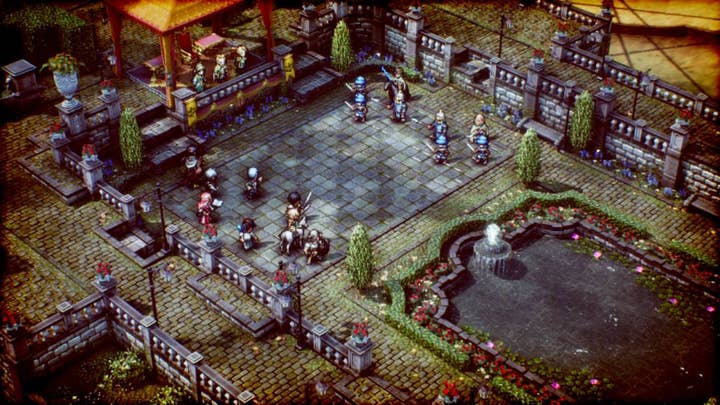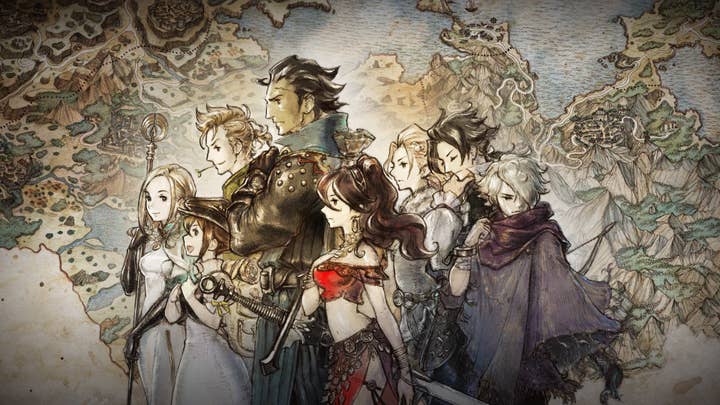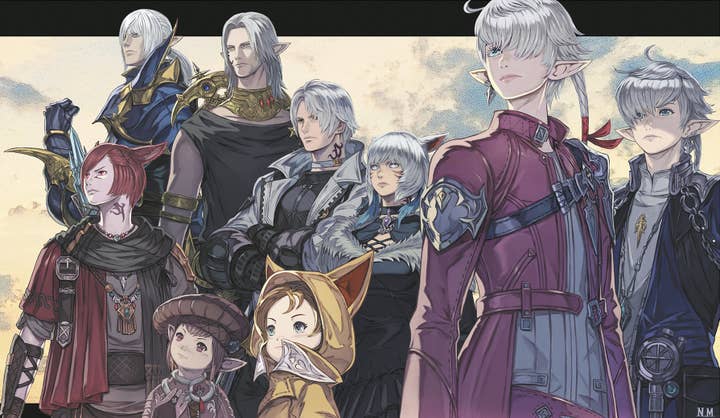Beyond NFT fumblings, Square Enix is reinventing itself | Opinion
Much attention is focused on an ill-advised side project – but the company's increased focus on small creative projects and its deft mining of gaming history is much more interesting
A video game company doing something that upsets or annoys some subset of its consumers is hardly a rare occurrence – you can't please all of the people all of the time, after all, and while some companies balance things a little better than others, you could still make a decent-sized list in any given week of Things Companies Have Done That People Are Mad About.
On occasion, this becomes a pattern of behaviour, which can be indicative of some poor decision-making at a high level – often related to taking an existing audience for granted while trying to pivot too aggressively to a new strategy or business model. But generally speaking you can't read too much into the occasional moment of upset. Every company has its turn in the barrel.
Every now and then, though, a company's direction and strategy becomes so questionable, its penchant for annoying large swathes of consumers at every turn so consistent, that you start to wonder if you're watching an implosion, or an executive team playing through some kind of perverse Brewster's Millions scenario.
Square Enix's behaviour in the past few years has a lot of people wondering out loud if everything is okay
Perhaps the best known instance in recent years was when Konami's management team lost their collective minds for several years after making a few Yen from cheap mobile games, leading them to nigh-on destroy the Metal Gear franchise, casually toss a Silent Hill title that had serious Hollywood talent attached to it, dismantle much of their console development pipeline, and publicly wreck their relationship with the company's most recognisable and successful creative figure, Kojima Hideo (who admittedly is probably a headache for managers to work with, but if you're not capable of or willing to work with tricky creative egos, what in all the hells are you doing on the management team of a publishing company?).
Konami is currently in the process of slightly sheepishly picking up the pieces from its public meltdown, and has recently turned up to consumers' doors holding out a whole brace of new Silent Hill games like a petrol station flower bouquet.
Now it's the turn of another company to get consumers starting to feel like they're actually more worried than angry, and it's another venerable Japanese publisher: Square Enix, whose behaviour in the past few years has a lot of people wondering out loud if everything is okay.
This week actually summed up the concerns pretty nicely. On one side, we got news that Eidos Montreal – one of the western studios which Embracer Group bought from Square Enix at a knock-down price a short while ago – is in pre-production on a new game in the Deus Ex franchise, one of the IPs that came bundled in that price.
Now, to be clear, Embracer was pretty clearly waving around the Deus Ex news as a shiny distraction from the fact that it's also shutting down one of the studios included in the deal – mobile specialist Square Enix Montreal, which it had rebranded to Studio Onoma only a few weeks ago – but the point that the company is moving forward with a well-loved franchise that Square Enix had done a remarkably bad job of managing still stands.
Other publishers dabbled, passing around an NFT joint at a party occasionally; Square Enix retreated to its basement with an NFT bong and refused to come out
Throwing it into even more sharp relief was Square Enix' own news of the week – the announcement that Symbiogenesis, a name that the company trademarked recently, sparking widespread hopeful speculation of a return to the Parasite Eve franchise, is actually just some NFT nonsense. Needless to say, this was the catalyst for an almost perfect alchemical transmutation of hopeful buzz into scornful eye-rolling; well played.
Square Enix is no stranger to having what we might diplomatically describe as 'some weird stuff going on'. The development process for Final Fantasy XV, for example, was an industry psychodrama for almost a full decade (and the game itself, while charming in some ways, turned out to be weird, unfinished, and highly polarising even after all that time and money), while the company's management of its western studios and IPs was clearly troubled for quite a long time.
Fans of the company's games are arguably its greatest asset, as the immense goodwill held by titles like Final Fantasy and Dragon Quest is really what keeps Square Enix' business afloat when things at the company get weird – but they really started to get worried when the Embracer deal was announced, at around the same time that the company was getting really, really into NFTs. I mean, really into NFTs. Other publishers dabbled, passing around an NFT joint at a party occasionally; Square Enix retreated to its basement with an NFT bong and refused to come out.
To all the world – or at least to those paying attention – it looked like Square Enix was hurriedly divesting itself of pesky things like storied, experienced development studios and world-famous IPs like Tomb Raider, Hitman, and Deus Ex, all in order to let itself spend more time with its new obsession. Company statements started to be peppered with language about NFTs and the metaverse. The firm's merchandising arm – a consistently successful part of its business – launched preorders for new high-quality figures of Final Fantasy VII characters, which would cost significantly more than equivalent figures because they also came with ownership of an NFT.
It all seemed to be perfectly encapsulated by a week when Embracer revealed that it was reviving Deus Ex, while Square Enix disappointed core fans by announcing yet more NFT nonsense when they had been hoping for the return of a well-regarded franchise.

I would like, though, to take a moment to look at this from the other side – because I think the negativity about what's been happening at Square Enix is unfairly obscuring some much more positive aspects of the company's direction in recent years. Don't get me wrong, the continuing obsession with NFTs deserves all the eye-rolls it gets. The inability of the firm – or at least of a handful of senior executives who are seemingly more scared of admitting that they were fooled by digital snake oil salesmen than they are of losing their company's money – to recognise at this point that the NFT market has collapsed is genuinely jaw-dropping.
Every other company that had a toe in the water is now putting their shoes and socks on, and backing away from the pond; announcing a new NFT initiative right now is like paddling between the Titanic's lifeboats trying to resell your ticket for the return voyage.
However, we should also acknowledge that the NFT projects we've seen thus far from Square Enix are very small scale. These are experiments – relatively cheap experiments, involving a pretty small number of staff and a low level of investment. A couple of NFTs attached to some merchandise; an experimental digital art project. Just like Meta's metaverse development efforts, which I talked about in similar terms recently, are a very small project within the overall scale of the company and could fail utterly without really denting its bottom line, Square Enix' NFT efforts are attracting an outsized degree of publicity and attention for something that's likely only a rounding error in the company's accounts.
If you step back from any of the froth over NFTs, the actual output of Square Enix in gaming terms over the last few years has been pretty great in terms of creativity
The idea that the western studios and IPs were sold to let Square Enix focus on NFTs doesn't really hold water (and to be clear, that's an idea I primarily see alluded to in forum posts and YouTube rants, not something that's really part of the mainstream discourse about the firm), just because the NFT efforts aren't major enough to distract from the company's other businesses.
Instead, you could look at the sale of those studios as being quite a welcome and much-needed ripping off of a band-aid. Square Enix was tacitly acknowledging that it didn't really have the right skills and attitude to effectively manage those assets, and acting decisively by selling them to a company that should be a much better cultural fit, thus freeing up its management bandwidth to focus on the things it's actually good at.
That last point stands up, I think, because if you step back from any of the froth over NFTs or other management decision making, the actual output of Square Enix in gaming terms over the last few years has been pretty great, at least in terms of creativity and risk-taking.
The company has very effectively shifted gears towards prioritising some smaller and mid-size titles, something that few of its rivals have done with any success. It still has some very big juggernaut projects running, of course, perhaps principal among them being Final Fantasy XVI and the FF7 remake games, but much of its output of late has been in the form of smaller, more unusual projects. Many of these are overtly designed to bridge the company's 30-odd year history of hit games with modern hardware and sensibilities – an approach that has yielded a reopening of the company's archives, giving us projects that range from the huge scale of the FF7 remake down to the remastering of titles like Chrono Cross or Final Fantasy 8 for modern hardware.
Much more interestingly from a creative standpoint, it has delivered a series of smaller, almost indie-esque titles like Octopath Traveller and Triangle Strategy, which draw inspiration from Square Enix' history but build upon it in interesting ways. Alongside this the publisher has a solid supplementary line-up of both the traditional RPGs it built its name on, such as the well-reviewed new instalment in the Star Ocean franchise, and left-of-field cult hits like Nier: Automata.
The negativity about what's been happening at Square Enix is unfairly obscuring some much more positive aspects of the company's direction in recent years
Running in the background of all of this – and helping to provide the financial stability that allows Square Enix to give its teams some creative license – is its behemoth MMORPG, Final Fantasy XIV. Once a development hell drama on a par with FFXV's time in limbo, the reborn game is now a massive commercial success and a critical darling – and on the way to that success, director and producer Yoshida Naoki helped to establish the proof of concept for how best to take advantage of the resonance Square Enix' early games still have for huge swathes of the modern audience.
As well as the usual Final Fantasy series thematic staples – chocobos, moogles, a guy named Cid, crystals, and so on – FFXIV also lifted major storylines, locations, characters and scenarios wholesale from earlier Final Fantasy games going back as far as the very first game, deftly weaving them into the tapestry of the online RPG's own world and story. It's hard to describe to those who haven't played the game or who are not deeply invested in the Final Fantasy back catalogue, but it's remarkably well-done in practice, using the series' history to inform and support the experience of the new game, without binding it slavishly to being a remake, a revisiting, or a pure saccharine dose of nostalgia.
This approach has clearly resonated incredibly well with consumers – and recognising that, you start to see traces of the same thinking across Square Enix' recent line-up.

It doesn't always work, of course. Stranger of Paradise: Final Fantasy Origin, for example, is one of those rare games that's "so bad it's somehow enjoyable," but nonetheless not exactly a triumph for the formula, while the attempts to mine Final Fantasy nostalgia for NFT projects are, of course, hare-brained.
Yet Square Enix, a publisher that for a long time leaned incredibly heavily on a small number of widely spaced tentpole releases – we may never know how close the endless delays to FFXV actually came to sinking the company entirely – has become a company with a highly diversified release schedule year to year.
Square Enix hasn't articulated a specific vision for where it sees itself going, but we're certainly witnessing a gradual transformation in the company
Moreover, it is almost certainly delivering a higher proportion of new IPs than any other major publisher – not bad for a company whose biggest major franchises boast literally dozens of instalments across several decades. In fact, the way the company is mining its history – most notably Final Fantasy, but also its deeper back catalogue of titles – is reminiscent of how Nintendo has effectively built an empire on a careful balancing of recognition and nostalgia with innovation and quality. Square Enix isn't yet doing it as deftly as Nintendo, whose theme park area at Universal Studios Japan is like the perfect distillation of that formula into physical form, but at the very least it's learning from the right master.
So by all means, roll your eyes at the NFT nonsense – but the negative coverage of that ill-advised dalliance shouldn't give anyone the impression that Square Enix is betting the farm on NFTs. At most, they're another small, siloed experiment in a company that has in recent years been doing a lot of experiments with smaller teams – most of them far more creatively interesting and much more commercially meaningful than anything they've done with NFTs.
Square Enix hasn't articulated a specific vision for where it sees itself going, but we're certainly witnessing a gradual transformation in the company, which has quietly turned its release schedule into something quite unlike any other publisher's line-up. How this will work in the mid to long-term is a billion dollar question, but it's a much more complex question, with a much more nuanced set of answers, than the excess of attention to its NFT fumbles suggests.
Sign up for the GI Daily here to get the biggest news straight to your inbox

